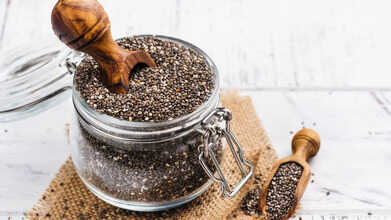- Health Conditions A-Z
- Health & Wellness
- Nutrition
- Fitness
- Health News
- Ayurveda
- Videos
- Medicine A-Z
- Parenting
- Web Stories
Why Eating Dinner Before 7 PM Aids Digestion And Better Health

Dinner time (Credit: Canva)
Meal timing has emerged as a crucial aspect of diet and nutrition, with experts emphasizing the importance of consuming your evening meal within a specific two-hour window. Eating earlier in the evening, between 5 p.m. and 7 p.m., has been shown to have significant benefits for weight loss, digestion, and sleep quality.
Known as the "early bird approach," this strategy aligns with your body's natural circadian rhythm, which influences various bodily functions, including metabolism, digestion, and hormonal release.
The human body's circadian rhythm is essentially its internal clock, governing physiological processes based on light and darkness. During daylight hours, metabolism, digestion, and hormonal activities peak, while they slow down in the evening as the body prepares for rest.
A 2022 study published in Cell Metabolism demonstrated that individuals who ate their main meal around 5 p.m. burned more calories than those who consumed dinner later.
This finding is further supported by registered dietitian Tara Schmidt of the Mayo Clinic Diet, who noted that late-night eating disrupts the body’s natural cadence, increasing the risk of obesity and sleep disturbances. "We know that when people eat later at night, they have a higher risk of obesity," Schmidt told Fortune.
Benefits of Early Dinner
1. Weight Loss and Metabolic Health
Early dinners promote better digestion and energy expenditure. Research shows that eating four hours before bedtime allows your body ample time to digest food, preventing the post-meal sluggishness that often leads to weight gain. Moreover, taking a post-dinner walk—sometimes humorously referred to as a "fart walk"—can aid in digestion and lower blood sugar levels.
Sustained high blood sugar levels are a hallmark of diabetes, so having an early dinner followed by light physical activity can contribute to better blood sugar control and overall metabolic health.
2. Improved Sleep Quality
Eating too late in the evening can interfere with your ability to fall asleep and stay asleep. Late-night meals, especially those rich in fats, acids, caffeine, or spices, are more likely to cause indigestion, heartburn, and acid reflux. These conditions not only disrupt sleep but also increase your chances of waking up in the middle of the night.
In contrast, early meals tend to be more digestible, allowing your body to focus on restorative processes during sleep. Foods that promote better sleep are typically rich in lean protein, fiber, and complex carbohydrates, helping to regulate blood sugar and promote restful slumber.
3. Heart Health
Timing your meals earlier also has implications for cardiovascular health. A 2023 study found that eating dinner after 9 p.m. increased the likelihood of suffering a stroke by 28%. For every hour past 8 p.m., the risk of stroke or a transient ischemic attack, a temporary blockage of blood supply to the brain, increased by 8%.
Risks of Late-Night Eating
Late-night eating has been linked to obesity and other metabolic disorders. Studies show that eating late can increase hunger and alter appetite-regulating hormones like ghrelin and leptin. Late dinners also reduce energy expenditure, slow down digestion, and disrupt fat metabolism, making it easier to gain weight.
Additionally, eating late may trigger changes in the body's adipose (fat) tissues, promoting fat storage rather than fat breakdown, further increasing the risk of obesity.
Foods for a Healthy Metabolic Dinner
Eating the right kinds of foods at dinner can significantly enhance metabolic health and support weight loss, better digestion, and restful sleep. Focus on these types of foods:
- Include options like grilled chicken, fish, tofu, or legumes to keep you feeling full and support muscle repair overnight.
- Dark leafy greens (spinach, kale), broccoli, and other fiber-packed veggies aid digestion and maintain stable blood sugar levels.
- Opt for quinoa, sweet potatoes, or brown rice for slow-releasing energy that won’t spike blood sugar before bed.
- Incorporate small amounts of avocado, olive oil, or nuts to help your body absorb nutrients and maintain satiety.
- Chamomile or peppermint tea can aid digestion and promote relaxation before sleep.
Avoid high-fat, spicy, or acidic foods that may cause indigestion and disrupt sleep patterns.
Croissant In a Gut-Friendly Food, Says NHS Surgeon

Credits: Insta and Canva
Whenever we have to think of a quick food, we think of breads. However, we are usually advised against it, but Dr Karan Rajan, NHS Surgeon has a different view to offer. He says that croissant, if made in the traditional way could actually be a gut-friendly food. “This is my legal argument to explain why croissants should be considered a gut health food. It has to be a traditional croissant because it is made using laminated yeast dough that undergoes slow fermentation. This process allows the yeast and lactic acid bacteria to partially break down some of the starches, making the final product easy to digest compared to under-fermented white bread,” he said.
What Is The Right Way To Have A Croissant?
He suggests that if you let a baked croissant cool down before eating, it helps turn the starch into resistant starch. This, also helps feed the bacteria in the colon. “A croissant eaten mindfully for breakfast allows the body to lessen its said,” he said.
So, Is Croissant Really Better Than Regular Bed?
Experts have suggested that when dough ferments, natural bacteria and yeast partially break down the starches and gluten. This also makes the final product easier to digest and gives it a unique flavor.
Whether or not the croissant is healthy really depends on the way it is made. If the croissant is fermented, it is gut-friendly, otherwise, it is not.
What Should People Keep In Mind?
People must go for fermented bread, as it is easier on the stomach. This is especially good for those who feel bloated after consuming regular bread. The fermented bread will also have a lower glycaemic effect, which means they cause a slower rise in blood sugar as compared to unfermented or regular bread. It is also important to note portion control, however, warn experts.
However, one must keep in mind that while most people can have fermented breads, it should be consumed in moderation.
Are There People Who Cannot Have This Gut-friendly Food?
People with celiac disease or serious gluten intolerance should stay away from them. This is because not always does fermentation remove all the gluten. However, fermented options could be better for those struggling with diabetes, however it should still be eaten in moderation.
What one must keep in mind is that fermented breads are smarter treats, but mot an everyday meal. For everyday meal, try to balance it with whole grains, millets, and high-fibre foods.
Dr Ulysses Wu, MD, with Hartford HealthCare also noted that sourdough, which is also a type of fermented bread could have potential health benefits.
“The long fermentation process partially breaks down gluten and phytic acid, a compound that could block mineral absorption. For many people, that makes sourdough easier on the stomach,” Dr. Wu notes.
The fermentation process, he says could lower glycemic index, which could help with blood sugar control. Furthermore, it is high in prebiotics, which can act like fuel for the healthy bacteria already in your gut.
However, he also notes that fermentation does not fully remove gluten, so it must be consumed in moderation.
8 Cups Of This Drink Can Help Increase Your Longevity But More Than That Could Increase Your Risk Of Heart Diseases

(Credit-Canva)
One of the major point of conversations right now is longevity. People are learning day by day about what may affect their biological age and how, why and which way they can lower it. Many studies have pointed out that things like sugar, and some drinks may lower it, however, a new study shows that there may be some unexpected heroes among our daily drink consumption.
A study recently published in the British Journal of Nutrition showed something interesting: drinking about seven to eight cups of tea, coffee, and plain water every day might help you live longer.
Researchers looked at the drinking habits of over 182,000 people and found that hitting this total number of drinks, when balanced well, offered the best protection. It lowered the risk of dying from all kinds of serious problems, including cancer and heart disease. The main finding is that the mix of drinks is key—it's not good to overdo it, as too much might actually be bad for your heart.
How Do Tea, Coffee Or Water Help Your Health?
The research figured out the best possible way to combine these drinks to get the most health benefit:
Optimal Daily Total
The number one rule is to drink a total of seven to eight beverages every day. This total includes your water, coffee, and tea.
Coffee and Tea Ratio
Once you're hitting that daily goal, the best way to mix the coffee and tea is in a 2:3 ratio. This means for every two cups of coffee, you should have three cups of tea. This specific blend was found to be the most powerful for protecting you against dying from heart problems, cancer, and diseases of the lungs and stomach.
Hydration
The experts stress that the most important thing is to just stay hydrated first. Get your total number of drinks up to seven or eight. After you've done that, then you can start swapping some of your water for the healthier mix of coffee and tea.
How Much Tea Or Coffee Should You Drink?
The study also came with important warnings about drinking too much or too little of the mix:
If You Drink Very Little: If you currently have less than four total drinks a day, just adding a cup of coffee or tea won't help much. You need to focus on drinking more water first to reach the main goal of being fully hydrated.
If You Drink Too Much: If you are drinking nine or more cups of fluid a day, replacing water with more tea or coffee could actually raise your risk of dying from heart disease. More is not always better! Finally, the scientists noted two important things:
They can only say there's a link (an observation) between the drinks and living longer; they can't say for sure that the drinks are the direct cause of longer life. The study didn't know how people prepared their drinks—whether they added a lot of sugar or milk, which could affect the health benefits. The main takeaway is to focus on getting your overall daily fluid intake to seven to eight drinks and then use the beneficial mix of coffee and tea wisely.
Is It Safe to Eat Chia Seeds During Pregnancy? Expert Explains

Credits: Canva
Pregnancy is a unique and exciting journey, full of changes, decisions, and the constant desire to give your baby the best start in life. Nutrition becomes particularly important during this time, as what a mother eats can impact both her own health and the development of her baby. One ingredient that has been gaining popularity among expectant mothers is chia seeds.
Though tiny, these seeds are packed with nutrients and can be a versatile addition to a pregnancy diet. To understand their benefits, we spoke with Dr. Deepa, Senior Consultant at Yashoda Super Speciality Hospital Kaushambi, who shared how chia seeds can support maternal and fetal health.
Benefits of Chia Seeds for Pregnant Women
Chia seeds are simple to incorporate into daily meals as you can sprinkle them on oatmeal, mix them into yogurt, blend them into smoothies, or even add them to baked goods.
Their mild taste and texture make them easy to enjoy, which is one reason why many pregnant women are turning to these seeds. According to Dr. Deepa, there are several ways chia seeds can help during pregnancy:
Supports Digestion
Constipation and other digestive issues are common during pregnancy due to hormonal changes and slower digestion. Chia seeds are high in soluble fibre, which can help regulate bowel movements. When soaked in liquid, they expand into a gel-like texture that aids digestion and promotes a feeling of fullness. This not only helps prevent overeating but also supports healthy weight gain, which is important for both mother and baby.
Helps Maintain Blood Sugar Levels
Fluctuating blood sugar levels can be a concern for expectant mothers, sometimes leading to gestational diabetes. The fibre in chia seeds slows sugar absorption into the bloodstream, helping to maintain stable blood sugar and energy levels. By including chia seeds in meals, pregnant women may reduce the risk of sudden sugar spikes and maintain steadier energy throughout the day.
Aids Hydration
Hydration is essential during pregnancy, and chia seeds can play a supportive role. Dr. Deepa points out that chia seeds are versatile and can be added to a wide variety of dishes, from smoothies and salads to yogurt or baked recipes. When mixed with water or other liquids, they absorb moisture, helping to keep the body hydrated and supporting overall wellness.
Nutritional Power for Mother and Baby
Although small, chia seeds are a nutritional powerhouse. They are rich in omega-3 fatty acids, fibre, protein, calcium, and antioxidants. These nutrients support brain development in the fetus, improve digestion, help maintain healthy blood sugar levels, and contribute to overall maternal health.
Dr. Deepa recommends consuming chia seeds in moderation. Eating too many may cause digestive discomfort due to their high fibre content. A typical portion is about one to two tablespoons per day. She also emphasizes that pregnant women should consult their healthcare provider before making significant dietary changes, especially if they have pre-existing medical conditions.
Including chia seeds as part of a balanced, varied diet can help pregnant women feel nourished, support digestion and hydration, and provide essential nutrients for their growing baby. With their versatility and health benefits, chia seeds are a convenient and powerful addition to a pregnancy-friendly diet.
© 2024 Bennett, Coleman & Company Limited

